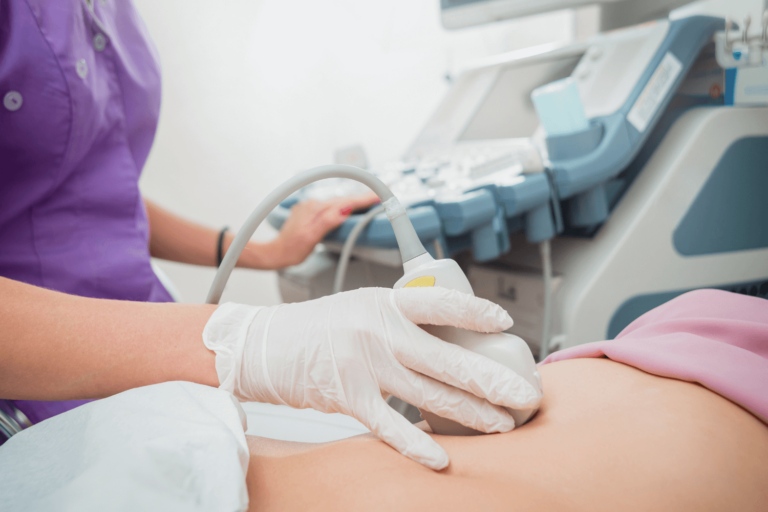We get it: there are few experiences as stressful as wondering whether or not you are pregnant. Many women experience intense amounts of stress thinking about the possibilities – and they start analyzing every possible detail about potential symptoms. Early symptoms of pregnancy can vary from woman to woman, but there are a few standard symptoms that are most common:
Missed period
One of the first symptoms of pregnancy a woman may notice is a missed period. Keeping track of your menstrual cycle is important – if you have historically regular periods and suddenly find yourself a few days late, that could be an early indication of pregnancy. Most at-home pregnancy tests are accurate after a missed period; testing before a missed period may yield a false-negative result.
Nausea, Vomiting, or Lack of appetite
Also known as “morning sickness” (though it can happen at any point during the day), feeling nauseous or vomiting is another early symptom of pregnancy. This may also include a general lack of appetite, sensitivity to smells, or aversions to particular foods.
Fatigue
Many women experience fatigue during pregnancy. Fatigue tends to be more persistent than just feeling tired; being fatigued may continue even after having an adequate amount of sleep, proper nutrition, or a little caffeine. If you find yourself unable to keep your eyes open by early afternoon and are experiencing any other early pregnancy symptoms, it may be time to take a pregnancy test.

Tender or Swollen Breasts
Because your body experiences a change in hormones during pregnancy (namely, an increase in estrogen and progesterone), many women notice that they develop tender, swollen breasts. While many women experience this symptom monthly as part of their menstrual cycle, it tends to feel more intense and sticks around a lot longer when a woman is pregnant. So while it may not be a surefire way to tell you’re pregnant, if you notice your breasts have become swollen and tender, it could be a symptom of early pregnancy.
Headaches or Migraines
Fluctuating hormones can also trigger headaches or migraines in some women. While many women experience these symptoms as part of their monthly menstrual cycle (because hormones fluctuate throughout a woman’s cycle), it is also possible that an increased frequency of headaches or migraines may indicate early pregnancy in a woman.
Light Cramping or Bleeding
Some women experience something called implantation bleeding and/or cramping, which is when there are noticeable symptoms related to the fertilized egg implanting into the lining of the uterus. This may feel like very mild cramping in one specific side of the abdomen and may be accompanied by light spotting. It’s important to note that not all women experience these symptoms and that implantation cramping is not severe – if you are experiencing severe cramping, it is best to seek medical attention immediately.
Higher Basal Body Temperature (BBT)
If you are using the Natural Family Planning (NFP) method or are just keeping close track of your menstrual cycle, you may have been keeping track of your basal body temperature (the lowest temperature your body reaches during a time of rest). BBT is generally elevated immediately after ovulation but may remain elevated if pregnancy has occurred.
Your Early Pregnancy Symptoms Can Vary
These are only some of the most common symptoms of early pregnancy. Each woman and pregnancy is unique – there are women who experience all of the above symptoms at the same time and other women who may only suspect they are pregnant because of a late or missing period.
It’s also important to remember that many early pregnancy symptoms are also symptoms that arise shortly before a woman begins her period (because these symptoms are caused by fluctuating hormones, which happen both in pregnancy and throughout the menstrual cycle). It is helpful to keep track of your menstrual cycle and note any symptoms you may be feeling as your period approaches to establish a baseline for what is “normal” for you and what is not.
While these symptoms may be common indicators of pregnancy, it’s also possible that they are symptoms of other concerns that are not related to pregnancy. Stress can also cause a lot of the above symptoms; women who are concerned that they will become pregnant may find that their elevated stress levels regarding the situation are causing a delayed period, or the anxiety may be causing them to feel nauseous, tired, etc.
Consult a Medical Professional
If you suspect that you are pregnant or are experiencing any of the above common pregnancy symptoms, it is best to speak with your medical provider about your concerns and request a pregnancy test be done. If you need assistance finding the right medical provider, reach out to our team! At-Home Abortion Facts can help direct you to the appropriate care you need.




